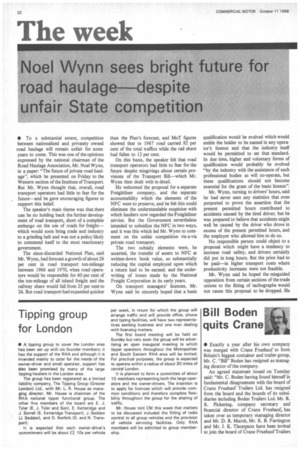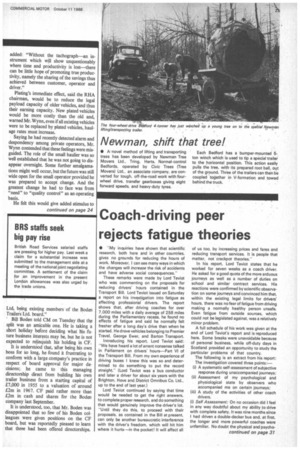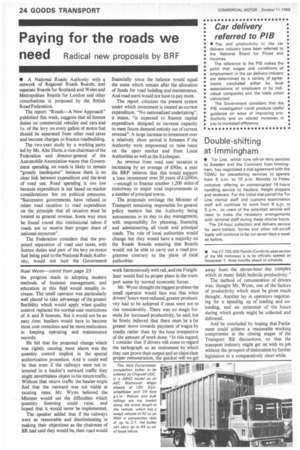The week
Page 24

Page 25

Page 26

If you've noticed an error in this article please click here to report it so we can fix it.
Noel Wynn sees bright future for road haulage despite unfair State competition
• To a substantial extent, competition between nationalized and privately owned road haulage will remain unfair for some years to come. This was one of the opinions expressed by the national chairman of the Road Haulage Association, Mr. Noel Wynn, in a paper: "The future of private road haulage", which he presented on Friday to the Western section of the Institute of Transport. But Mr. Wynn thought that, overall, road transport operators had little to fear for the future—and he gave encouraging figures to support this belief.
The speaker's main theme was that there can be no holding back the further development of road transport, short of a complete embargo on the use of roads for freight— which would soon bring trade and industry to a grinding halt and was not a policy likely to commend itself to the most reactionary government.
The since-discarded National Plan, said Mr. Wynn, had forecast a growth of about 26 per cent in road transport ton-mileage between 1966 and 1970, when road operators would be responsible for 60 per cent of the ton-mileage of all inland freight and the railway share would fall from 25 per cent to 24. But road transport had expanded quicker than the Plan's forecast, and MoT figures showed that in 1967 road carried 82 per cent of the total traffics while the rail share had fallen to 12 per cent.
On this basis, the speaker felt that road transport operators had little to fear for the future despite misgivings about certain provisions of the Transport Bill—which Mr. Wynn then dealt with in detail.
He welcomed the proposal for a separate Freightliner company, and the separate accountability which the elements of the NFC were to preserve, and he felt this could eliminate the understandable suspicion with which hauliers now regarded the Freightliner service. But the Government nevertheless intended to subsidize the NFC in two ways, and it was this which led Mr. Wynn to comment on the unfair competition vis-a-vis private road transport.
The two subsidy elements were, he asserted, the transfer of assets to NFC at written-down book value, so substantially reducing the capital employed upon which a return had to be earned; and the underwriting of losses made by the National Freight Corporation in its early years.
On transport managers' licences, Mr. Wynn said he sincerely hoped that a basic qualification would be evolved which would entitle the holder to be named in any operator's licence and that the industry itself would be permittted to set that standard. In due time, higher and voluntary forms of qualification would probably be evolved "by the industry with the assistance of such professional bodies as will co-operate, but these qualifications should not become essential for the grant of the basic licence".
Mr. Wynn, turning to drivers' hours, said he had never seen any statistics that even purported to prove the assertion that the present permitted hours contributed to accidents caused by the tired driver; but he was prepared to believe that accidents might well be caused by the driver who drove in excess of the present permitted hours, and the employer who allowed him to do so.
No responsible person could object to a proposal which might have a tendency to increase road safety, and drivers certainly did put in long hours. But the price had to be paid—in higher transport costs where productivity increases were not feasible.
Mr. Wynn said he hoped the misguided opposition from certain sections of the trade unions to the fitting of tachographs would not cause this proposal to be dropped. He added: "Without the tachograph—an instrument which will show unquestionably where time and productivity is lost—there can be Little hope of promoting true productivity, namely the sharing of the savings thus achieved between customer, operator and driver."
Plating's immediate effect, said the RHA chairman, would be to reduce the legal payload capacity of older vehicles, and thus their earning capacity. New plated vehicles would be more costly than the old and, warned Mr. Wynn, even if all existing vehicles were to be replaced by plated vehicles, haulage rates must increase.
Saying he had recently detected alarm and despondency among private operators, Mr. Wynn contended that these feelings were misguided. The role of the small haulier was so well established that he was not going to disappear overnight. Some further amalgamations might well occur, but the future was still wide open for the small operator provided he was prepared to accept change. And the greatest change he had to face was from "need" to "quality control" as an operating basis.
He felt this would give added stimulus to the progress made in adopting modern methods of business management, and education in this field would steadily increase. The small operator was particularly well placed to take advantage of the greater flexibility which would apply when quality control replaced the normal-user restrictions of A and B licences. But it would not be an easy time: hauliers would have to become most cost conscious and be more meticulous in keeping operating and maintenance records.
He felt that the proposed change which was rightly causing most alarm was the quantity control implicit in the special authorization procedure. And it could well be that even if the railways were not interested in a haulier's outward traffic they might nevertheless object to his return traffic. Without that return traffic the haulier might find that the outward was not viable at existing rates. Mr. Wynn believed the Minister would see the difficulties which quantity licensing could raise, and hoped that it would never be implemented.
The speaker added that if the railways were as reasonable and discriminating in making their objections as the chairman of BR had said they would be, then road would work harmoniously with rail, and the Freightliner would find its proper place in the transport scene by normal economic forces.
Mr. Wynn thought the biggest problem the small operator would face was that when drivers hours were reduced, greater productivity had to be achieved if rates were not to rise considerably. There was no magic formula for increased productivity, he said, but he firmly believed that there must be a far greater move towards payment of wages by results rather than by the hour irrespective of the amount of work done. -In this regard. I consider that if drivers will come to regard the tachograph as an instrument by which they can prove their output and so claim their proper remuneration, the quicker will we get
This third Dumpmaster compaction bulker to be ordered by Chigwell UDC. is a 0842 model on an AEC Mammoth Major chassis of 15ft 91in. wheelbase and 24 tons g v. w Refuse and bulk tailings are top loaded along the entire length of the vehicle, which has a swept volume of 42 cu yd. With a compaction ratio of up to 2:1, the bulker can carry up to 84 cu.yd. of loose refuse
away from the eleven-hour day complex which in many fields bedevils productivity."
The method of remuneration of drivers was, thought Mr. Wynn, one of the factors of productivity which must be given much thought. Another lay in operators negotiating for a speeding up of loading and unloading, and an extension of the hours during which goods might be collected and delivered.
And he concluded by hoping that Parliament could achieve a reasonable working compromise in the closing stages of the Transport Bill discussions, so that the transport industry might get on with its job without the prospect of dislocation by further legislation in a comparatively short while.












































































































